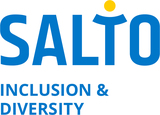Holy Dialogue - Inclusion and diversity colleague support group on interfaith dialogue & youth work
Theme
To address the topic of (cultural) diversity, SALTO Inclusion & Diversity RC, in cooperation with the Network of the National Agencies of the Erasmus+: Youth in Action and European Solidarity Corps programmes, has planned 3 thematic “Embracing diversity” cycles, each covering a period of 2 years.
After closing the cycle on anti-racism, in 2024 we start addressing the topic of interfaith dialogue. We want to take on a journey through faith, belief and how to build projects to encompass different perspectives in youth & community projects.
Religion is often seen as a source of difference and conflict, but does it have to be that way? In a world where (religious) identity often divides, we seek to explore the potential of religion as a solution and a catalyst for cultural diplomacy. Interfaith dialogue is becoming increasingly recognised by governments and institutions, as crucial for building cohesive communities. By perceiving interfaith dialogue as a positive resource and engaging in it meaningfully, we can build bridges across diverse communities, promote understanding, respect and peace.
What is interfaith dialogue and how can YOUth work address it is important question that we want to tackle with this cycle.
We want to create space for reflection and putting our own, social and organisational attitudes and practices under the magnifying glass. We’ll have a closer look at the basic elements of interfaith dialogue, its potential and limits in the youth work. We want to discuss the pressing matters and challenges affecting interfaith dialogue and get inspired to make our programmes and organisations more inclusive and embracing of human differences. The IDCSG should allow ID officers to question their own and each other’s way of working and look for the ways to improve and support interfaith dialogue practices.
Aim
To support the NAs in developing youth workers 'diversity management’ skills in order to create better opportunities for young people faced with or at risk of religious discrimination.
Objectives
- To discuss and exchange about interfaith dialogue in different countries.
- To gain better understanding of what interfaith dialogue is/it’s not, its mechanisms and effects.
- To reflect on our own biases, structural issues and organisational practices.
- To strengthen NA and beneficiaries’ inter-faith dialogue and anti-discriminatory behaviours and practices.
- To exchange strategies, methods and resources for promoting interfaith dialogue as a mean for community and peacebuilding in the framework of the Erasmus+:Youth in Action & European Solidarity Corps projects.
Programme elements
- Intro & getting to know each other
- Sharing national realities
- Getting inspired by local practices
- Looking into interfaith dialogue concepts, elements and basic principles
- Reflecting about NA/ID officer role in change making
- Mapping the needs and resources
- Sharing tools, tips & tricks
- Creating an individual action plan
- Evaluation
Practicalities
- Co-organising NA: SALTO SEE
- Participants: NA ID officers
- Venue: Sarajevo, Bosnia & Herzegovina
- Arrival: 7th of October 2025 - by 18h
- Departure: 10th of October 2025 - after breakfast
- Costs: approximately 1000EUR per person (all in). To be paid afterwards. SALTO SEE will send an invoice. Travel costs are covered by participants.
- We have space for max 15 participants!
- REGISTER HERE by 17th of April 2025!
This IDCSG builds on:
- 5 ID Talks webinars on interfaith dialogue: online, Feb - April 2024,
- Seminar “Power of interfaith dialogue”: 6-10 October 2024, Vienna, Austria. Cooperation with the ATNA.
- Study visit on interfaith dialogue and youth work in Malta: 2-6 December 2024, Malta. Cooperation with MT & PLNA.
- Publication "Power of interfaith dialogue" – May 2024 - February 2025. Supported by ATNA
- Training course “Spirit of dialogue”: 19-24 May 2025, Marocco. Cooperation with SALTO Euromed & FRNA.
- Partnership building activity on interfaith dialogue (cross-sectoral event): 20-24 October 2025, Poland. Cooperation with PLNA & SALTO EECA.

